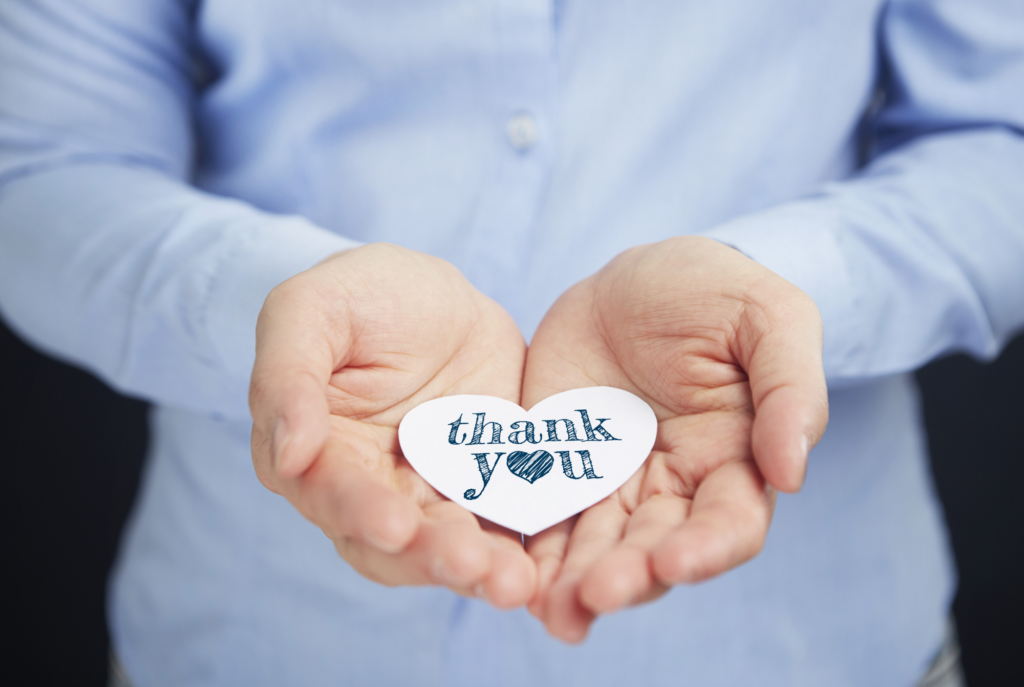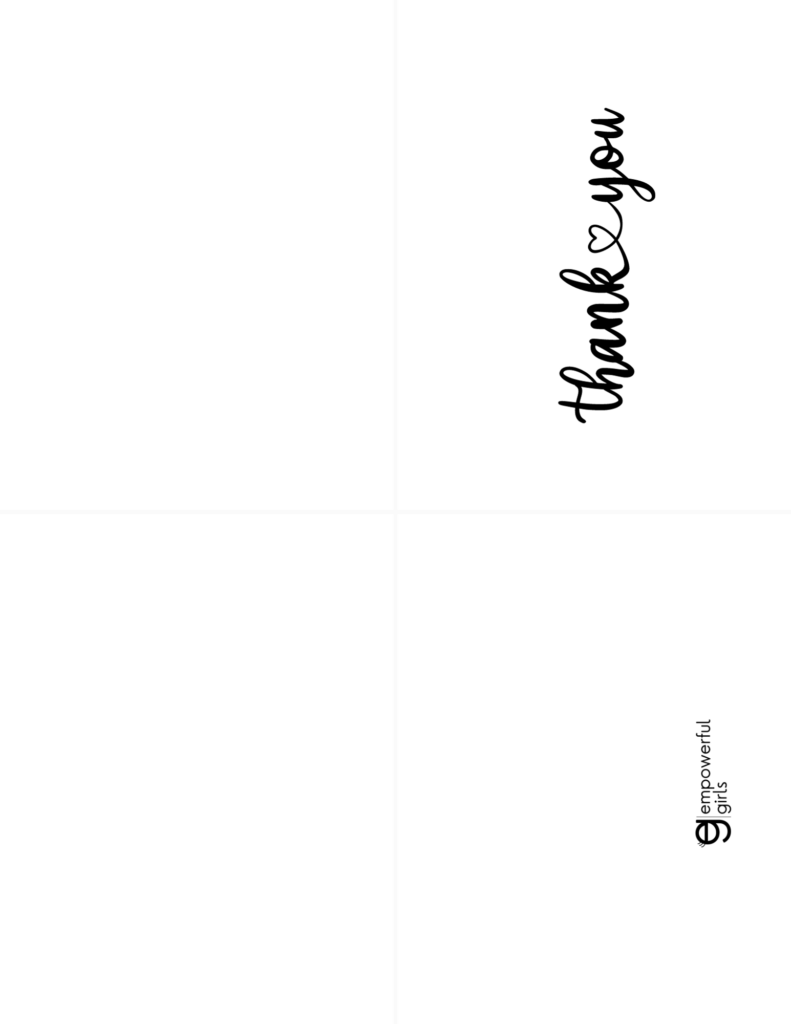
A Different Gratitude Perspective
We’re on to November, and later this month we celebrate Thanksgiving in the US, so I’ve got a different perspective for you about gratitude. I discussed that topic before – in episode 03 we covered the science of gratitude, tools to practice it and keeping a journal. And in episode 49 we talked about having more versus never enough, and being grateful even when things aren’t great. But this time I want to tell you about the importance of saying “Thank you” and the impact it can have on you and others.
Parents teach and often remind their kids to say “Thank you” for things big and small, like when a stranger holds a door for you, or your aunt gives you a gift, or when your parent helps you with a project due tomorrow. Some kids get annoyed when their parent asks for the upteenth time, “Did you say thank you?” But maybe instead of rolling your eyes at them, you could consider that your parents might be on to something.
Thank You Studied
A few years ago, Sara Algoe and other researchers at the University of North Carolina at Chapel Hill conducted a few experiments to examine how, when people witness or see others share gratitude, how that impacts the way people respond. They tested it out a few ways. One experiment had some participants view an article with corrections marked on it as well as a handwritten thank you note supposedly from the article’s author to the person who made the corrections. Participants who saw the corrections and thank you note were more likely to help make corrections too and were interested in being friends with the article’s author and the person who made corrections. When people see others who help receive gratitude from a person, they’re more willing to help the grateful person, too.
In another experiment, participants watched videos of couples expressing gratitude to each other in different ways–some expressed gratitude for their partner’s qualities (like being a good listener) while others focused on how their partner’s generosity benefitted them (like helping them out). Results showed that participants preferred those people who expressed gratitude for their partner’s qualities. People want to be friends with others who are kind and show gratitude for others.
This research illustrated how gratitude connects people–not just the grateful person and the person being thanked, but also those who witnessed the appreciation. Gratitude grows good feelings within a group.
Research Applied
Think about how these findings could apply in your life. Say you’re with a group of friends at lunch, and a friend realizes she forgot to bring one. You notice this and so you share half of your sandwich with this friend, who thanks you. Another friend sees your offer, and they share their apple with that friend, and another girl gives that friend a can of soda, and that friend thanks them too. Not only will that friend and those who shared feel good, but so will others in your group who witnessed the exchange and people sitting or walking nearby who saw you share and heard that friend say thank you. They will also be more likely to do something kind for someone else when they see an opportunity.
Or maybe you’re at home with your family, and you take initiative to set the table for dinner without being asked. Your mom notices this and thanks you for doing that, and your sibling sees what you did and hears your mom express gratitude. After dinner your sibling helps clear the table and your mom thanks them. Everyone’s mood at dinnertime feels a little warmer and you all feel closer because they’ve witnessed kind acts and kind words.
Throw Kindness Around Like Confetti
There’s already too much negativity, fault finding, and complaining in the world, and it spreads so quickly with technology. Sometimes it seems hard to find goodness in the world, but it’s out there and can be shared just as quickly using the same methods. Maybe you’ve heard the phrases “Kindness is contagious” or “Throw kindness around like confetti.” Helping others is kind AND thanking others is kind. When those things happen, there’s a ripple effect. As the studies proved, the whole group of people who witnessed the exchange–the person who said thanks, the person that was thanked, and the people who saw it happen–all feel better from that collective experience. And because they saw others’ examples of kindness and gratitude, they want to do the same, and the goodness continues to spread. We can offset all the negativity by showing others humanity.
How Thank You Feels
Think about how it makes you feel when someone genuinely thanks you for something you said or did, or for a character strength you have. From my own experience, a simple Thank You has turned my bad day around, all because someone thought to say thanks and helped me feel noticed and valued. For years I’ve saved every Thank You note I’ve received in a keepsake box. Even emails and testimonials I get from podcast listeners, I group them in a folder. If there’s ever a day I feel down or discouraged, I’ll look back on cards from friends or messages from girls. They give me a boost and also make me want to share thanks to someone else, too.
Thanks Starts with You
You don’t have to wait for someone else’s example to inspire you, you can be the starter. And it doesn’t have to be a grand gesture; you can simply say Thanks, or Thank you, or I appreciate it. You can write it down, like scribble it on a sticky note and leave it where your parent will see it. You can add a note on your teacher’s whiteboard. You can write a Thank You card for someone who helped you, like a neighbor or delivery person. You can also share thanks on social media–send a dm to thank a friend who sent you a meme that brightened your day or post about a shop whose clerk was extra helpful and tag them. Spread that kindness around and see what happens.
Thanks Goal
So I have a goal suggestion for you. For the next four weeks, every day find someone to genuinely thank out loud AND once a week write and deliver a Thank You note to someone. After the four weeks, reflect on how you feel after doing this thankfulness practice. How do you feel compared to when you started? Also note if there’s been a change in your relationship with your family or the overall vibe in your friend group. I think you’ll be pleasantly surprised by the effect that something so simple as Thank You can have.
Thank You Cards Printable
To help you with this, I created four simple “Thank You” cards for you to print out and write a note of thanks to someone for the next four weeks.
Resources
If you have a topic suggestion, I’d love to hear from you! Send an email (tweens get the OK from your parents) to hello@EmpowerfulGirls.com .
If you have social media already, follow me on Insta or tiktok @empowerfulgirls. I’m not encouraging or endorsing social media, but I’m on there to offer an unfiltered, uplifting alternative to what’s in your feed. Remember to get on the email list for the newsletter!
Also, if you enjoy listening to 10 for Teens + Tweens, I would truly appreciate you telling your friends about this podcast or leaving a review so others can find it and feel uplifted, too! Your support means the world to me!
